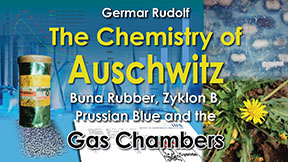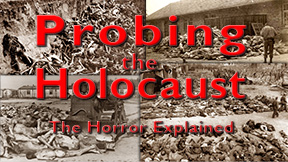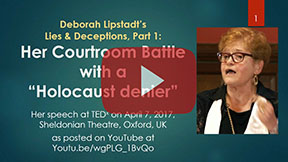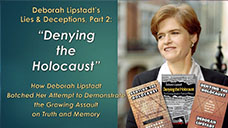A Rebel
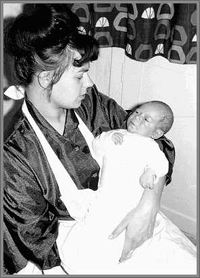 In Fall 1964, when it all began …
In Fall 1964, when it all began …29th October 1964.
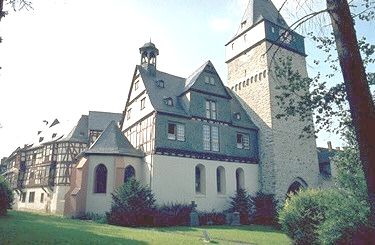 In the town, where I was born…
In the town, where I was born…Camberg in the Taunus Mountain, Hessen, some 30 miles northwest of Frankfurt/Main.
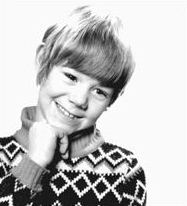 1972: a fine lad …
1972: a fine lad …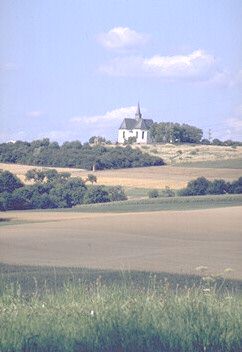 Home Kreuzkapelle, Camberg.
Home Kreuzkapelle, Camberg.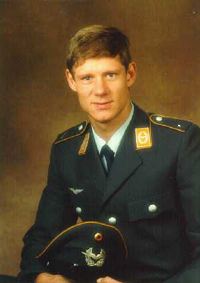 Germar Rudolf in 1990 in his Luftwaffe uniform.
Germar Rudolf in 1990 in his Luftwaffe uniform.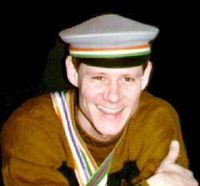 Germar Rudolf in 1991, doctoral candidate at the Max Planck Institute for Solid State Research and an officer in the Catholic German Student Fraternity Nordgau (with fraternity cap and ribbons).
Germar Rudolf in 1991, doctoral candidate at the Max Planck Institute for Solid State Research and an officer in the Catholic German Student Fraternity Nordgau (with fraternity cap and ribbons).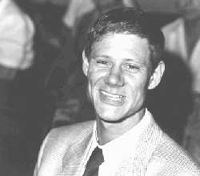 Germar Rudolf in Summer 1992 as expert witness during the thought crime trial against Swiss Revisionist Max Wahl in Munich, here in a Biergarten during lunch recess.
Germar Rudolf in Summer 1992 as expert witness during the thought crime trial against Swiss Revisionist Max Wahl in Munich, here in a Biergarten during lunch recess.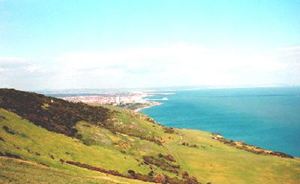 Eastbourne, East Sussex, England, my home between 1996 and 1999—and again in 2009/2010.
Eastbourne, East Sussex, England, my home between 1996 and 1999—and again in 2009/2010.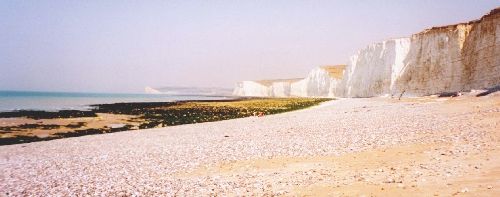 The Seven Sisters, seen from Birling Gap, East Sussex, England, one of my home town’s beaches between 1996 and 1999—and again in 2009/2010.
The Seven Sisters, seen from Birling Gap, East Sussex, England, one of my home town’s beaches between 1996 and 1999—and again in 2009/2010.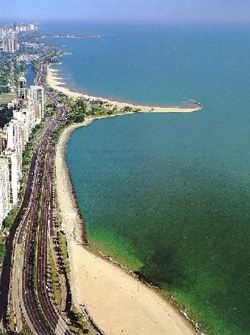 Chicago’s north side beach. My home between 2002 and 2005.
Chicago’s north side beach. My home between 2002 and 2005.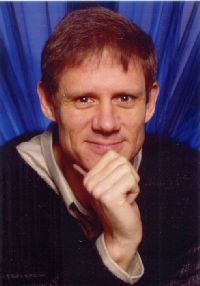 Germar Rudolf in early 2003.
Germar Rudolf in early 2003.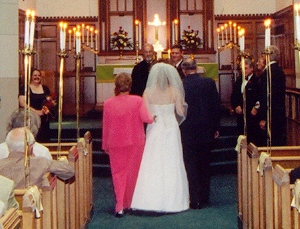 The future Mrs. Rudolf is led down the aisle by her parents to meet her future husband at the altar—Sept. 11, 2004.
The future Mrs. Rudolf is led down the aisle by her parents to meet her future husband at the altar—Sept. 11, 2004.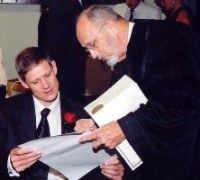 Dr. Robert Countess and I shortly after the wedding on September 11, 2004. Pastor “Dr. Bob,” a good friend of mine, wed us on that day.
Dr. Robert Countess and I shortly after the wedding on September 11, 2004. Pastor “Dr. Bob,” a good friend of mine, wed us on that day.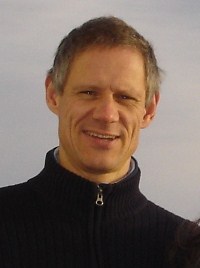 On a P&O ferry to England in January 2010 after spending Christmas at my parents’ home in Germany.
On a P&O ferry to England in January 2010 after spending Christmas at my parents’ home in Germany.Who is that dude? There are many pages out there talking about me, some of them in a flattering way, while others are derogatory. The truth is, as usual, probably somewhere in the middle.
Here I have revealed my deepest secrets, exposed my darkest hours and brightest moments in life.
Alright, perhaps not all of them.
I am a rebel. An intellectual one only, though. Yes, I am, and I started early, although not very intellectual back then, I guess….
And here is how it all started: When I was two weeks old—wasn’t I ugly???—I caused my mother some trouble when she nursed me, because I already had my lower two incisor teeth. That is where all the trouble started…
Anyway, my jaw was too weak, so those teeth eventually had to be removed (so claims the dentist), and I had to live without those two lower incisor teeth until I got the real ones at age six or so. At least those came out perfectly straight! :)
Then, at the age of eight months or so, my mother was feeding me the usual baby meals with a plastic spoon. One of these days, however, my mother pulled the spoon out of my mouth, but, surprise, surprise, it was gone! I had bitten it off and swallowed it down. Can you imagine the panic in my mother’s face when she tried in vain to locate that spoon in my mouth? My mother brought me to the hospital, because she feared I get injured by the sharp edge of the broken-off spoon. That was actually the first and last time I have ever been in a hospital as a patient so far! And even then, they kept me only for observation—and fed me sauerkraut, hoping this would get entangled around the spoon and pull it down. Physicians have weird fantasies… Anyway, the spoon came out at the other end a day later, and everything was fine…
I told you I am a rebel! I made my mother feed me with a proper spoon! No plastic baby spoons for me anymore! :) Of course I do not remember any of this; these are just the kind of stories parents use to tell their kids as they get older.
I skip the usual boy stories and rush to the next picture to show you where I grew up. The second picture is the main entry to the town where I was born and grew up until I turned 15: Camberg, but with only 5,500 inhabitants, some 30 miles northwest of Frankfurt, Germany.
This little town received town rights in 1281, but never really grew much ever since. It has medieval town walls and towers, and very old houses. Not quite as pretty as the famous town of Rothenburg ob der Tauber, but quite nice. The only exciting thing this town experienced during WWII was an Allied plane crashing into the old swimming hall, so the town’s old building substance survived the war unharmed and was neatly restored in the 70ies and 80ies. It actually lasted until 1975 or so before Camberg got a new swimming hall.
My father was the managing director of a catholic vacation resort in this town. My two siblings (my brother is one and a half year younger, my sister a year older than I) and I enjoyed the huge yard that belonged to this resort: two playgrounds, a small pool, woods, big lawns, lots of trees to climb on—and fall down from :-( . Later, my parents bought an old monastery, built in 1610, on top of a hill outside of this town. From this hill with a chapel named Kreuzkapelle (cross chapel, because of its shape) beside the monastery one can overlook the entire valley, see next picture (the monastery, then a restaurant of my parents, is hidden behind the trees to the right of the chapel. A little bit of white of the walls can be seen through the trees). The monastery was a ruin when my parents bought it for just $2,500 dollars. My father rebuilt it with enormous efforts. Getting running water and electricity to that place alone cost them some $60,000. For us kids it was a world dominated by undergrowth, woods, tree houses, earth borrows, cave-explorations, wild boars, pheasants, rabbits, sheep, cattle, deer, and all the things children love when they grow up in the middle of Mother Nature. Since our parents did not have a lot of time for us in those years—they had to work hard 16 h/7 days a week to keep the business running and pay back their debts—we kids grew kind of wild in those years. The downside of it was that we were isolated up there on top of that hill.
It was kind of a blessing when my parents gave up this place (the financial burden threatened the marriage) and moved into my mother’s city of birth (Remscheid, close to Cologne) when I was about 15. The first year in that city was pretty tough on all of us. My brother and I were suddenly deprived of our climbing trees, and throwing sticks and stones in a crowded downtown neighborhood wasn’t a good idea either. We trashed some 10 windows in the first twelve months there, and the police visited my mother several times because my brother and I couldn’t stop climbing on our neighbors’ houses. Our neighbors didn’t like that at all!!!! But where else could we possibly have followed our natural instincts? The best part of it took place in winter when we had fresh snow. These stupid city people would remove all of the snow on the streets and sidewalks, so where could we get the raw material to make our snowballs to through at passing cars and pedestrians? Very easy: the roof tops were never cleared! So up we climbed, hiding behind the roof ridge, and having fun making all those car drivers and pedestrians wonder where these snowballs came from :) Well, I guess that was one of the days when my mother had teatime with the cops. But the cops actually understood much better than our stupid neighbors, and nothing ever happened… Was that a rebellion against civilization? Against concrete, steel and asphalt? I am not sure. I wasn’t particularly political at age 15, but I sure know that I need some nature around me or I will languish.
Though we were behaving sort of like “Crocodile Dundee in New York” during the first year there, it got us kids back into civilization. It took a while, though, and trees are still pretty much tempting today, but at least I can stay away from house facades pretty well (most of the time). :)
In 1983 I started studying chemistry at Bonn university, graduating in 1989 with a master’s degree. After that I had to join the German army as a draftee to serve my compulsory year. I was assigned to a ground missile defense unit of the Luftwaffe (air force). After our basic training was over, I volunteered to give the draftee’s speech to the recruits as we took our solemn vow to protect the freedom and the rights of the German people. This ceremony was held during the morning of 9th November 1989, which turned out to be quite a memorable event. In my speech I noted that the vow of the German soldier to defend the right and freedom of the German people presumes the will of political leaders to defend this right and freedom. One of the unfulfilled rights of the German people, however, was the reunification of all German people in one state and in freedom. At that time, unfree, communist East Germany still existed. For my urging the German reunification I was praised by the commanding officers, but criticized by some in the ranks. That very evening in Berlin the Wall fell, and every critic was silent …
After my army year, I received a scholarship from the once world-famous Max Planck Society which is still considered Germany’s finest research society, but the days of glory were definitely over after I started working there … no, I mean after the end of WWII. :) So it was a real blessing to get a scholarship from them so I could prepare an utterly useless PhD thesis in theoretical crystallography at the Max Planck Institute for Solid State Research in Stuttgart—I already hear my former PhD supervisor shriek: “You still don’t understand the scope and importance of your own work!” Did I mention I am a rebel?
Through all of my years at universities, I also was a member of Catholic student fraternities. These fraternities are a member of the Cartel-Union of Catholic German Student Fraternities (Cartell Verband, CV), at that time Europe’s largest organization of academics, to which many famous German personalities belonged or belong, such as Josef Cardinal Höffner, Joseph Cardinal Ratzinger (well, he is the Pope now…), Friedrich Cardinal Wetter, Archbishop Johannes Dyba, Former Bavarian Minister President Franz-Josef Strauss, Former President of the German Parliament Philipp Jenninger, former German Attorney General Alexander von Stahl, and various other VIPs of German society.
Since I was bored by my PhD thesis and the entire field it was embedded in, and also did not like the career path it was offering me—and also because I was looking for distraction from an unhappy love affair (Annemarie, I blame it on you! Just kidding…)—I started research into a topic that had peeked my curiosity since summer 1989: The (in)famous Leuchter Report. The Leuchter Report was an expert report presented by Fred A. Leuchter jr. as evidence during a Canadian trial against German immigrant Ernst Zündel for denying the Holocaust. Leuchter, at that time America’s sole expert in execution technologies, stated in his report, among other things, that the poison gas allegedly used in Auschwitz and Majdanek concentration camps to kill hundreds of thousands of victims should have left permanent chemical residues in the walls of the gas chambers, but his analysis of wall samples had shown that no significant traces could be found. Based also on other findings, he concluded that the rooms claimed to have been used as mass execution gas chambers could not have been used as such. The historical and political dimension of such a finding, if it could be confirmed, would be tremendous. I wanted to know…
A letter to the editor of a small newspaper about that issue put my name out there as an expert in chemistry interested in this issue. I in turn started collecting addresses of individuals also interested in the topic. In April 1991, when I had the first results of my initial literature search worth conveying, I sent this to my small address list. It didn’t last long until I was contacted by a defense team that asked me to prepare an expert report on that issue. Here, too, the defendant was on trial for “Holocaust denial” (whatever that means). In the middle of August 1991 I traveled to Auschwitz, examined the pertinent structural remains, and took a number of wall samples. A short while later, the latter were analyzed by the well-known German analytical research company Institut Fresenius. After I had received the results, I summarized all my findings in an expert report, which was basically done at the turn of the years 1991/92. In it I came up with conclusions that were unwelcome—I basically confirmed and improved Leuchter’s thesis—and my results were published shortly before I was to have my final PhD exam scheduled. My expert report created a major earthquake in German society. It also led the directorate of the very institute where I had prepared my PhD thesis to issue a press release condemning as immoral that I had asked, and sought answers to, specific questions about the How and How Much of my research topic. Figure that: A world-famous institute for exact sciences declares in public that asking questions about the circumstances and values of a certain research topic is morally reprehensible! Wow, what a statement! Any PhD student asking questions, and trying to find answers, about the Hows and How Muchs of their research objects will have to be called immoral from now on! No more exact data in science from then onward! No exploration into how things happen around us! That is, of course, the end of all science! And it came from the German Mother of All Sciences! Gee, what a bunch of hypocrites, fairies and sissies! And the best of it all was that behind closed doors, the then managing director of this institute, Prof. Dr. Arnd Simon, admitted that I was right in what I had done, and that even my results were probably correct, only one couldn’t publish it when the topic is too controversial, and he admitted that he had to distance himself from it in order to preserve his career and position. After this, my patience with these hypocritical and arrogant ivory tower scientists was definitely over.
What followed between June 1993 and early 1996 was a series of persecutorial measures by all members of the German society: The Max Planck Institute kicked me out, my final PhD examination was first put on hold, then I was threatened that my thesis would be rejected if I did not withdraw it, using a Hitler law of 1939, still on the books in Germany today, that allows to withhold or withdraw academic degrees in case of lacking “academic dignity.” My home was raided three times by the police and all computers, files, research papers, books I authored, and correspondence confiscated. Under massive pressure by media and Jewish lobby groups, my employer had to dismiss me. Two landlords kicked me out of my apartment without notice as a result of media smear campaigns. I was put on trial, because my expert report allegedly libels and insults the witnesses and victims of the Holocaust. Since my report allegedly makes people assume that some Jews lied when they testified after the war, the German courts also considered my expert report to incite the masses to hate Jews. I therefore was sentenced to 14 months in prison in 1995 for inciting the masses to hate the Jews—although the court had to admit that Jews aren’t even mentioned in my expert report other then as objects of the historical events investigated, let alone that any judgment is made about them.
Remember what I wrote at the top of this article?
Imagine an expert specializing in analyzing blood for its alcohol content. He is asked to analyze for their alcohol contents the blood samples of a defendant on trial for drunk driving. The expert’s tests show that the defendant was indeed drunk at the time of the crime. With his testimony, however, the expert contradicts the statements of many witnesses who claim that the defendant was not drunk at that time. Imagine the judge ruling not to admit the expert testimony because it makes the public assume that the witnesses lied for sinister motives, which amounts to insulting the witnesses, inciting to hatred against them, and stirring up the masses. When the expert witness finally dares to publish his results, he is himself put on trial for libel, stirring up the masses, and inciting to hatred against the witnesses and their kin. He is sentenced to 14 months in jail without probation.
Let me reword it:
Imagine an expert specializing in analyzing building material for its cyanide content. He is asked to analyze wall samples of a buildings said to have been the place of a crime. The expert’s tests show that the buildings were not the place of a crime. With his testimony, however, the expert contradicts the statements of many witnesses who claimed that these buildings were the place of a crime. Imagine the judge ruling not to admit the expert testimony because it makes the public assume that the witnesses lied for sinister motives, which amounts to libel etc. Hence, when the expert publishes his results, he is put on trial for libel, stirring up the masses, and inciting to hatred against the witnesses and their kin. He is sentenced to 14 months in jail without probation.
That is what happened. It did neither take long, nor a rocket scientist—or a Max-Planck-Scientist in this case—to figure out that Germany is not the country where intellectual rebels are welcome. So my then wife and I finally decided to leave Germany and never look back—at least not voluntarily. In 1996 we settled with our two little children at England’s beautiful sunshine coast in the west of East Sussex. There I established a small publishing house for rebellious literature… I told you! Actually, one of its main focuses is the critical forensic and documentary analysis of what is generally called “the Holocaust.”
Paradise in England did not last long, though, because it was only a matter of time when Germany would demand my extradition from England. Even though I had committed no crime under British law, extradition would be automatic due to legal agreements between Germany and the UK, or so I was advised at that time. (A later case of Australian revisionist Dr. Fredrick Toben indicates that this might have been a false assumption, though). Anyway, I lived under an assumed identity in hiding in England between 1997 and 1999, and my then wife disliked this to the point that in early 1999 she left me with our two children and filed for a divorce in late 1999.
Also in late 1999, the British media made a big fuss about my presence in Britain, leading to the long-expected German demand to have me extradited. By that time I had published many more books and papers deemed illegal under Germany’s tough censorship laws, meaning that I would not only have to spend the 14 months I had already been sentenced to, but probably many more years to come. I therefore decided not to wait for the police but to reach out for a presumed safe haven: I went to the United States of America, where I applied for political asylum in late 2000. Parallel to my efforts to gain permanent legal residence in the U.S., I immediately started expanding my publishing activities to the U.S., now also including English language material. Initially I resided in Alabama, but in September 2002 I relocated to the Chicago area.
In 2004 I married a US citizen, and in late February 2005 we had our first child. In the meantime the Immigration Services had rejected my asylum application in late 2004, against which I filed an appeal to the Federal Court. We also filed an additional application to obtain permanent residence in the U.S. due to my marriage. Considering the permanent financial drain caused by my ongoing legal struggle to receive permanent residence in the U.S., my publishing company was doing relatively well until early 2005, when big-time lawyer bills hit me. I then had to dissolve my office and fire my last secretary. With the help of supporters, however, things stabilized in August 2005, and by early October I even had some comfortable financial reserves which I would need bitterly in years to come…
On October 19, 2005, right in the middle of our contract negotiations to buy a certain house and right before our preparations to move into our new home, we had to show up at the Chicago offices of the U.S. Immigration and Naturalization Services. They wanted to verify that our marriage was genuine indeed. Such hearings are normal and occur roughly a year after a marriage between a U.S. citizen and a foreigner, just like in our case. We went to that hearing with our baby in her stroller, and got our marriage acknowledged as genuine in no time. But right after giving me the certificate of approval of our marriage, I was arrested on the pretext that I had allegedly missed an interview appointment five months earlier which had actually never existed to begin with (or at least I have never been informed of it, and neither has my lawyer). Neither my recognized marriage to a U.S. citizen nor the fact that my asylum case was still pending to be heard by a Federal Court were considered as reasons to exempt me from deportation. The U.S. Supreme Court did not even bother to look at my case. Hence, on November 14, 2005, I was deported to Germany, where German officials immediately arrested me in order both to serve the outstanding 14 months prison sentence and to face a new penal trial initiated against me for my publishing activities of the previous nine years while residing in England and the U.S. Although my publishing activities were completely legal in those countries, the German authorities opine that they have to apply the German Penal Code on legal activities in foreign countries.
A few months after my deportation, in spring of 2006, the U.S. Federal Court in Atlanta upheld the INS’s ruling that I did not deserve political asylum (a foregone conclusion, as they had agreed to my premature deportation the year before), but they at least removed all the obstacles the INS had built up for my return to the U.S. later on—save a five year ban, which expired on November 15, 2010.
In Germany I was again charged with “inciting the masses” that had allegedly occurred through publication of the results of historical research, which are available on the websites of my former publishing firm (today: armreg.co.uk, www.HolocaustHandbooks.com) as free downloads and which can also be purchased as hard copies. These research results have been summarized in my 2005 book Lectures on the Holocaust (German edition). This book was therefore also the focal point of my new indictment since, according to the prosecution, it represents in an exemplary manner my allegedly reprehensible opinions. The trial ended on March 15, 2007, with a sentence of 30 months imprisonment. Since there is nothing entertaining or enjoyable about those almost four years behind bars, I won’t dwell on them here. After serving this time in various German prisons, I was released on July 5, 2009.
During my incarceration, my U.S. wife, at that time a teacher in special education, had stayed at my parent’s near Cologne every summer break together with our daughter, and from there they both visited me as often as the prison authorities allowed. On the day of my release I met my wife in Cologne, where we had a nice lunch together on the cathedral’s terraces. Afterwards we stayed at my parents’ for a month. In early August my wife and daughter returned to the States, whereas I once more took residence at England’s sunshine coast in Eastbourne. My daughter from my first marriage joined my there in September 2009 in order to spend a year at an English high school and to catch up on those lost years with her father. In late October 2009 my wife and little daughter joined us in England for five months (since she had lost her job a few months earlier, so she was “free” for a while). End of August 2010 my by then bilingual older daughter returned home to her mother, whereas I left for northwestern Mexico in anticipation of the expected issuance of my “green card.” In spite of the promise to issue this document, once my ban had expired, the U.S. authorities dragged their feet, so I ended up spending Christmas and New Year in Mexico instead of at home. When the case was still unresolved with no end in sight at the end of January 2011, we sued the U.S. government in order to force them to adjudicate it.
While this was going on, I actually had to leave Mexico, as I was not allowed to stay there indefinitely. I then lived for a month at a friend’s house in Panama in March before returning to Mexico, because during my stay in Panama my case finally started moving. First my ban was officially declared expired. Then the U.S. authorities indicated that they will issue the green card as soon as a legal background check on me will have been performed. Since my lawyer expected that I may have to return to Germany in order to have another immigration interview at the U.S. Consulate in Frankfurt, I left Mexico in late April and returned to my native country, where I spent valuable time with my two kids from my first marriage. Toward the end of May my lawyer told me that he had been informed orally that the FBI’s investigation of my case resulted in my criminal convictions in Germany not being an obstacle for my immigration, so that my green card would be issued soon. On July 18, 2011, I did indeed receive in the mail an immigrant visa, and on August 2, I touched down in Washington, DC.
In the meantime, my wife’s paternal grandfather had died and had left a house in Pennsylvania to her aunt, who wanted to sell it to my wife. Hence I had no chance to settle into the home we had bought in 2005, as we moved out of it in early 2012. I lived in that Pennsylvania home until October 2022. I currently reside in Upstate New York, though.


